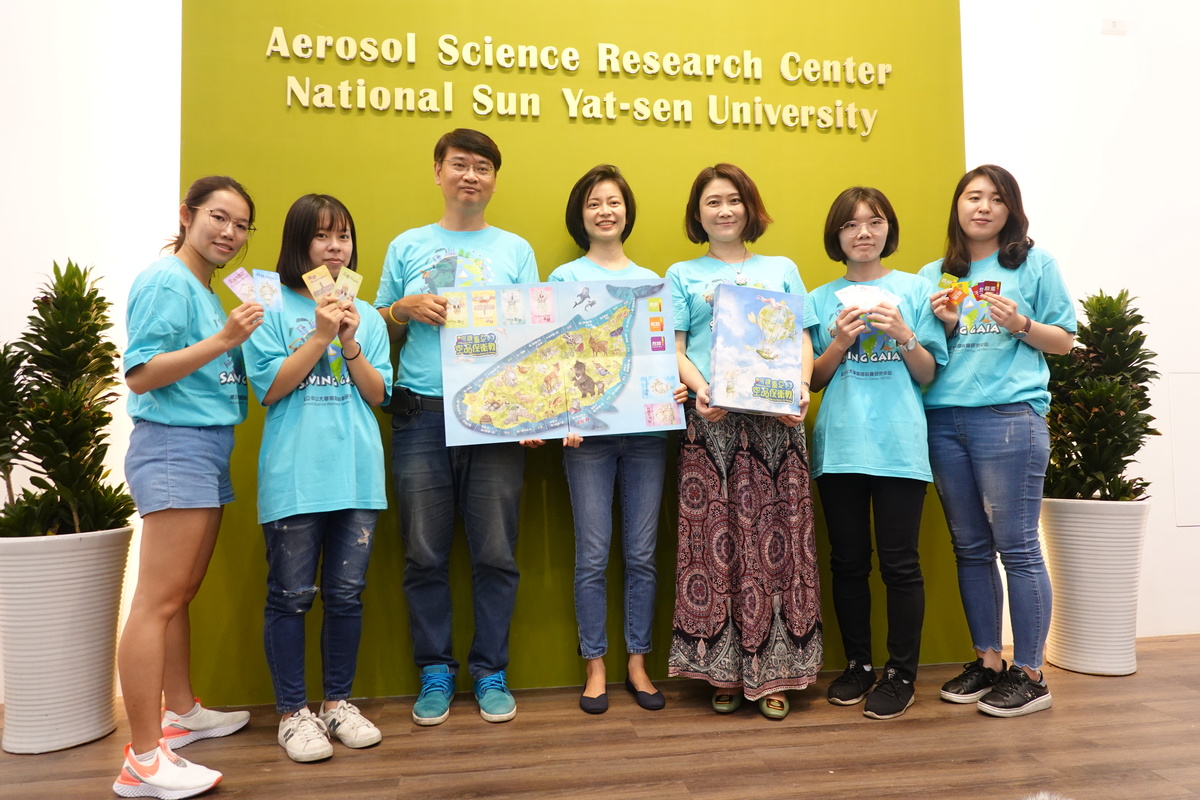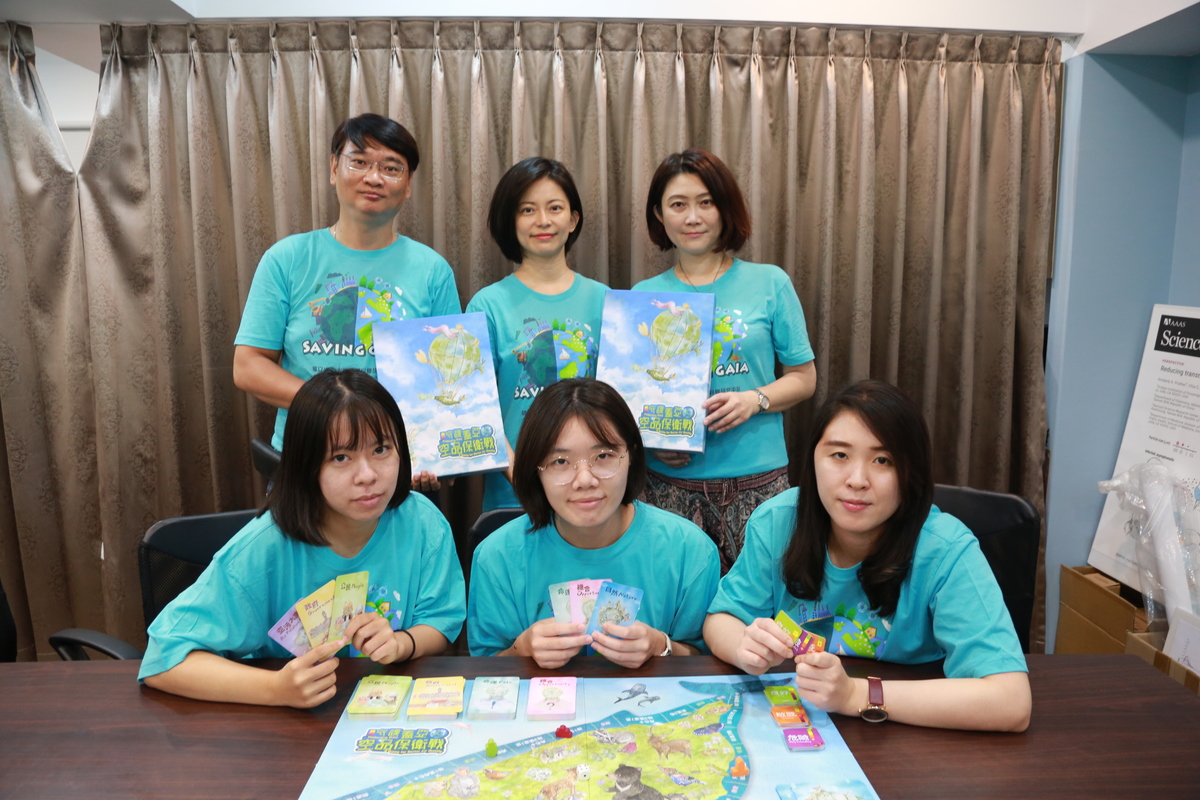Aerosol Science Research Center team designs “Protecting Gaia: A Battle for Better Air Quality”, a board game raising awareness about air pollution


Aerosol Science Research Center (ASRC) at National Sun Yat-sen University launched an educational board game – “Protecting Gaia: A Battle for Better Air Quality”, and wants to give away 1,000 copies to elementary and secondary schools in Kaohsiung. The players play the roles of People, Government, and Air Pollution Monster and try to improve or worsen the air quality. Besides loads of fun, the game builds up players’ awareness of the problem of air pollution and teaches them how to take action and protect the Earth.
“Gaia” is the personification of the Earth in Greek mythology. Paichi Pat Shein, Director of the Education Promotion Division, ASRC, and Professor at the Institute of Education said that the purpose of the game is to raise the environmental awareness of the younger generation and make them acquainted with six different levels of air quality (AQI - Air Quality Index) – good, moderate, unhealthy for sensitive groups, unhealthy, very unhealthy, and hazardous. The game starts with good AQI – this represents good air quality before industrialization.
Chia C. Wang, Director of ASRC and Associate Professor of the Department of Chemistry said that this game will be sent to local schools in Kaohsiung and that the team aims to promote this game abroad, hoping the game can be contextualized to reflect every different country’s air quality situation. In the future, the team plans to release an online version of the game on different platforms to further advocate air quality protection. The Earth illustrated in the game looks like a hot balloon, indicating that it is a common good for over 7 billion people in the world, who should work together toward sustainability. The contour of the Taiwan Island on the board is in the shape of a whale, and within the island are different drawings of species unique to Taiwan. The design of the game inspires the players to take care of the unique natural environment of Taiwan and raises their awareness of the close connection between the oceans and the air.
As for the rules, Professor Paichi Pat Shein said that the players play three different roles: of the People, the Government, and Air Pollution Monster. They throw the dice to advance on the board and draw Role cards, Fate cards, Opportunity cards, Nature cards, and players proceed according to the instructions on the cards to change the AQI on the board. This game lets the players reflect on the changes in air quality in the real world, said Professor Shein.
She further explained that the People role card encourages the player to take everyday actions to improve the air quality, such as “driving less and walking more” and “participating in anti-air pollution marches”. This role makes the player reflect on how they can positively influence the air quality by changing their everyday habits and makes them realize what actions can have a negative impact on air quality, such as outdoor burning.
The Government role card makes the player understand the impact of different policies on the environment, health, and economic development, including the “controlling the sources of pollution” and the “expansion of the heavy industry”. The Air Pollution Monster card represents all the polluting industries that worsen the air, the development projects, and the already existing sources of air pollution, such as special industrial districts, Shen'ao Power Plant, or the oil splitting plant project. This card informs the players about different issues related to air pollution and inspires them to care for the further development of the situation.
To enrich the game, besides the role cards, there are three other types of cards - Fate, Opportunity, and Nature cards. The Fate cards bring large-scale incidents into the game, such as ‘refinery closure’, or ‘fire at the plastics factory’, introducing the concepts of climate, seasons, and locality, allowing the players to understand how weather influences the air quality in Taiwan. The Opportunity cards include questions, such as “With what colors are different levels of air quality represented?”, or “What does this color stand for?”. If the player is able to answer the questions correctly, he/she can choose to improve or worsen the air quality. The Nature cards let the player learn that the air quality is not solely dependent on the human activity but also on natural phenomena, such as volcano eruptions and meteor strikes, which are impossible for humanity to control, and cause the air quality to worsen.
Read more about “Protecting Gaia: A Battle for Better Air Quality” game: https://reurl.cc/O1ZnXr
“Gaia” is the personification of the Earth in Greek mythology. Paichi Pat Shein, Director of the Education Promotion Division, ASRC, and Professor at the Institute of Education said that the purpose of the game is to raise the environmental awareness of the younger generation and make them acquainted with six different levels of air quality (AQI - Air Quality Index) – good, moderate, unhealthy for sensitive groups, unhealthy, very unhealthy, and hazardous. The game starts with good AQI – this represents good air quality before industrialization.
Chia C. Wang, Director of ASRC and Associate Professor of the Department of Chemistry said that this game will be sent to local schools in Kaohsiung and that the team aims to promote this game abroad, hoping the game can be contextualized to reflect every different country’s air quality situation. In the future, the team plans to release an online version of the game on different platforms to further advocate air quality protection. The Earth illustrated in the game looks like a hot balloon, indicating that it is a common good for over 7 billion people in the world, who should work together toward sustainability. The contour of the Taiwan Island on the board is in the shape of a whale, and within the island are different drawings of species unique to Taiwan. The design of the game inspires the players to take care of the unique natural environment of Taiwan and raises their awareness of the close connection between the oceans and the air.
As for the rules, Professor Paichi Pat Shein said that the players play three different roles: of the People, the Government, and Air Pollution Monster. They throw the dice to advance on the board and draw Role cards, Fate cards, Opportunity cards, Nature cards, and players proceed according to the instructions on the cards to change the AQI on the board. This game lets the players reflect on the changes in air quality in the real world, said Professor Shein.
She further explained that the People role card encourages the player to take everyday actions to improve the air quality, such as “driving less and walking more” and “participating in anti-air pollution marches”. This role makes the player reflect on how they can positively influence the air quality by changing their everyday habits and makes them realize what actions can have a negative impact on air quality, such as outdoor burning.
The Government role card makes the player understand the impact of different policies on the environment, health, and economic development, including the “controlling the sources of pollution” and the “expansion of the heavy industry”. The Air Pollution Monster card represents all the polluting industries that worsen the air, the development projects, and the already existing sources of air pollution, such as special industrial districts, Shen'ao Power Plant, or the oil splitting plant project. This card informs the players about different issues related to air pollution and inspires them to care for the further development of the situation.
To enrich the game, besides the role cards, there are three other types of cards - Fate, Opportunity, and Nature cards. The Fate cards bring large-scale incidents into the game, such as ‘refinery closure’, or ‘fire at the plastics factory’, introducing the concepts of climate, seasons, and locality, allowing the players to understand how weather influences the air quality in Taiwan. The Opportunity cards include questions, such as “With what colors are different levels of air quality represented?”, or “What does this color stand for?”. If the player is able to answer the questions correctly, he/she can choose to improve or worsen the air quality. The Nature cards let the player learn that the air quality is not solely dependent on the human activity but also on natural phenomena, such as volcano eruptions and meteor strikes, which are impossible for humanity to control, and cause the air quality to worsen.
Read more about “Protecting Gaia: A Battle for Better Air Quality” game: https://reurl.cc/O1ZnXr
Click Num:
Share
